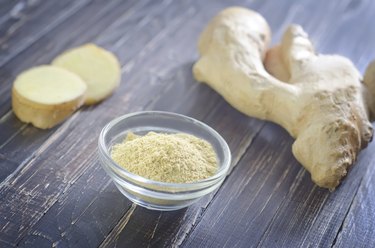
When you come across a recipe that calls for either ground or fresh ginger, know that ground ginger is not a substitute for minced ginger or fresh ginger. But either one can provide health benefits, which include guarding against the flu and holding nausea at bay.
Tip
You shouldn’t substitute ground ginger for fresh ginger. They don’t match in flavor and can compromise a dish when interchanged.
Video of the Day
Video of the Day
Ground Ginger vs. Fresh Ginger
Baking and cooking connoisseurs will find differences between ground and fresh ginger. The following lists why you shouldn't opt to use ground ginger to replace fresh ginger in a recipe:
- Different tastes. Fresh ginger doesn't taste much like ground
ginger, and because of this, the two variations of gingers are used in
different dishes altogether. For example, dried and ground ginger often are
used to flavor baked goods like ginger and banana bread, muffins and pies,
according to the College of Agriculture Sciences from The Pennsylvania State University.
The University of Rochester Medical Center states that the fresh ginger root contains essential oils and resins that give ginger its odor and spicy flavor. This is why you see fresh ginger used in Asian and Indian cuisine for stir-fries and sauces. - Flavor disbursement. Ground ginger is more easily dispersed in a
dish and can withstand higher cooking temperatures without compromising the
flavor. With fresh ginger, flavor is released into a dish more slowly. As
such, adding ginger early to a dish will provide a hint of flavor. Adding it at
the end will bring a pungent taste, per the Texas A&M AgriLIFE Extension System.
- Amount needed. According to Harvard Health Publishing, ground spices are much more potent than fresh, so all it takes is a dash to release
flavor. Even as little as an eighth of a teaspoon can add flavor.
If this entices you to cook with the spice, you can purchase ground ginger in the spice section of a supermarket.
Shopping for fresh ginger, however, requires more of a discerning eye. You should look for a ginger root that feels firm and heavy, has smooth skin and smells fresh — you will find the best when in season during the fall. You should avoid any ginger with wrinkled or moldy skin and feels light in weight. You can store fresh ginger wrapped in plastic or a paper towel for up to three weeks in the refrigerator and six months in the freezer, according to the American Culinary Foundation.
Read more: How Often Should You Replace Your Spices?
Health Benefits of Ginger
Whether you use ground or fresh ginger, you can reap the health benefits this spice offers, which include the following:
Keeping you from getting sick and helping you feel better when you do get a cold or flu. In an October 2014 perspective from Botanics: Targets and Therapy, researchers found that ginger components contain antimicrobial, antifungal and anti-infective properties.
Protecting you from UVB rays. In this same perspective, researchers also found that ginger can serve as an efficient prevention of ultraviolet B rays and a possible agent against UVB-induced skin disorders.
Preventing nausea. In a March 2016 study from Integrative Medicine Insights, researchers found ginger effective in the prevention of nausea and vomiting during pregnancy and chemotherapy. Although they don't find any consensus on the correct dosage among clinical studies, they do find a recommended safe daily dose of 1,000 milligrams. This can be taken through ground ginger tea, supplements and ginger added to recipes.
- The Pennsylvania State University: “The Zing of Ginger Root”
- Texas A&M University AgriLIFE Extension System: “Ginger”
- American Culinary Foundation: “Ginger”
- University of Rochester Medical Center: “Ginger”
- Harvard Health Publishing: “Can Everyday Spices Make You Healthier?"
- Botanics: Targets and Therapy: "Recent Perspectives on the Medicinal Potential of Ginger"
- Integrative Medicine Insights: "The Effectiveness of Ginger in the Prevention of Nausea and Vomiting during Pregnancy and Chemotherapy"
- National Center for Complementary and Alternative Medicine: Ginger
- University of Maryland Medical Clinic: Ginger